Intel Core 2 Quad Q9550S: A New 65W Quad-Core
by Anand Lal Shimpi on January 27, 2009 8:00 PM EST- Posted in
- CPUs
Adobe Photoshop CS4 Performance
To measure performance under Photoshop CS4 we turn to the Retouch Artists’ Speed Test. The test does basic photo editing; there are a couple of color space conversions, many layer creations, color curve adjustment, image and canvas size adjustment, unsharp mask, and finally a gaussian blur performed on the entire image.
The whole process is timed and thanks to the use of Intel's X25-M SSD as our test bed hard drive, performance is far more predictable than back when we used to test on mechanical disks.
Time is reported in seconds and the lower numbers mean better performance. The test is multithreaded and can hit all four cores in a quad-core machine.
Before we get to performance let's look at idle power consumption:
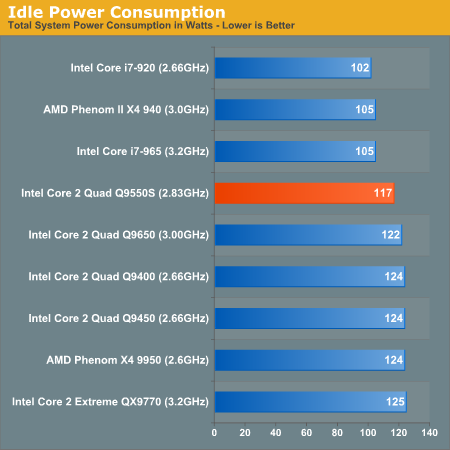
Now let’s look at performance:
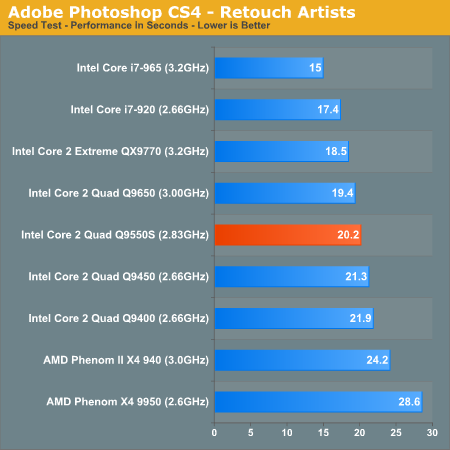
The best performers in this benchmark, by far, are the Core i7 processors. If you’re building the ultimate Photoshop machine, Core i7 is what you want. The entry level Core i7-920 is faster than the Core 2 Extreme QX9770, despite the latter being priced at over $1000.
Note that the Core 2 Quad Q9550S performs identically to a Core 2 Quad Q9500; right in between a Q9650 and a Q9450, just as you’d expect.
Next we measured the average power consumption of the entire machine during the Photoshop benchmark, the results are reported in watts. Lower numbers are better here:
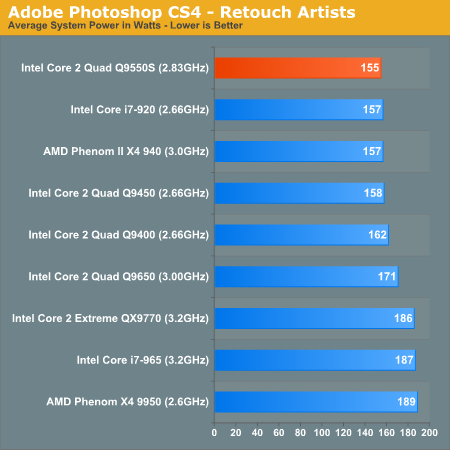
Now we see the benefit of the new -S parts; the Core 2 Quad Q9550S draws less power than any other chip we tested, including the much smaller, cooler running Q9400. While the Q9550S still uses the original 820M transistor Penryn core, the Q9400 is a smaller 456M transistor part.
While we don’t have a real Q9550 to compare to, if you look at the power consumption of the Q9650 and the Q9450 you can estimate that a Q9550 would be somewhere in between - perhaps around 165W. That would put the average energy savings of the 9550S at 10W.
We can also look at the maximum power consumed during the course of the test:
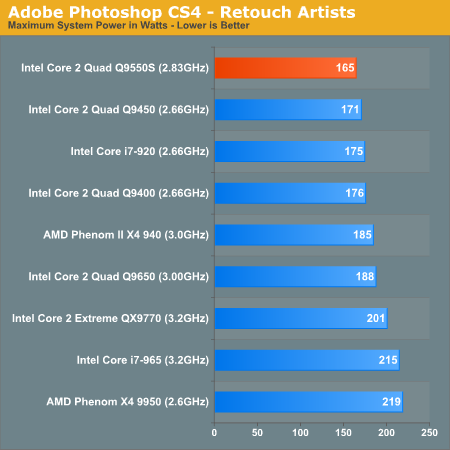
The Q9550S’ advantage amounts to around 15W under peak power draw.
Efficiency is equally important, here we’re looking at total energy consumed by the system over the life of the test. Energy consumed takes into account how long the test takes to complete, which will be shorter on faster machines.
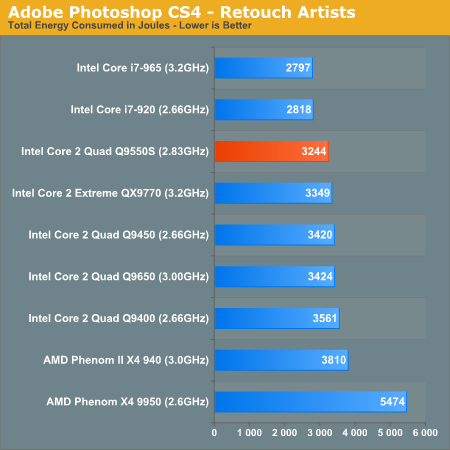
Here the Q9550S is marginally better than its Penryn siblings. There’s about a 5% drop in total energy consumed compared to a Q9650. And this is where the argument for energy efficiency falls short with the Q9550S; look at the total energy consumed on the Core i7, it blows the Q9550S out of the water.
While the Core i7-920 draws as much as 6% more power than the Q9550S, it also completes the benchmark in nearly 14% less time. If you want the best performance per watt, skip the Core 2 Quad Q9550S and buy the Core i7-920.










62 Comments
View All Comments
Jaramin - Wednesday, January 28, 2009 - link
The temperature data was really interesting. Would love to see that more often. And why leave out the AMD Phenom II X4 920 ?Holly - Wednesday, January 28, 2009 - link
Thanks for the review folks, much appreciated :-)yyrkoon - Tuesday, January 27, 2009 - link
How about buying a regular part, and under volting it yourself ? Can these new parts be under volted themselves ? Why isnt intel selling a Core 2 that is internally a laptop CPU, but externally a socket 775 part ? e.g. "we" would like a desktop 25W TDP CPU.Things that make you go "hmmm" ?
Too bad Cyrix, and possibly more ( Centuar ? ) CPU makers are no longer around, we're getting stuck in some stupid war between two manufactures, instead of embracing newer, and better technology; At Intel's whim. How about something truly revolutionary . . .
strikeback03 - Wednesday, January 28, 2009 - link
Probably because most users are not running off solar/wind, and a few more kW per month are not a huge deal.WillR - Wednesday, January 28, 2009 - link
A few kW average per month is most people's electric bills. :) I wanted to say, if more people considered every watt used a big deal then more people might be able to run off panels on their roof. Every watt certainly matters by the time you count how many electrical devices you have in your home.strikeback03 - Wednesday, January 28, 2009 - link
kWh, my bad.I live in upstate NY. Until there is a revolution in efficiency of panels, no one will be running 100% off solar up here.
Jansen - Tuesday, January 27, 2009 - link
http://www.dailytech.com/Intel+Cuts+Prices+Introdu...">http://www.dailytech.com/Intel+Cuts+Pri...Introduc...DailyTech did a bit on the price cuts and the announcements a little while ago.
But this chart is much nicer :-)
Giant Panda - Tuesday, January 27, 2009 - link
Intel's pricing is still so far off base on their quad cores. Right now on the egg a Phenom II X4 920 @ 2.8GHz is $195. The closest Intel CPU, the Q9550 Yorkfield @ 2.83GHz is $281.99. Granted, the Intel CPU is ever so slightly faster, and may overclock a bit better, but almost $100 worth of better? At the higher end the price gap becomes utterly ridiculous. The Phenom II X4 940 Black Edition @ 3.0GHz is $235. The closest Intel CPU, that also has an unlocked multiplier like the AMD, is the Core 2 Extreme QX9650 @ 3.0GHz which costs 1,029.99. Again, granted, the Intel CPU may be slightly faster and a better overclocker, but that is a price difference of 794.99. I could build an entire midrange system for that. What I would much rather see as a consumer, rather that a processor that consumes a bit less power, is a quad that is actually reasonably priced. While this seems to be the direction AMD has gone, Intel still charges you and arm a leg just for entry to the quad club. I'm no AMD fanboy, but I do believe in buying what gives the biggest bang for the buck. I bought an lga 775 motherboard almost a year ago because AMD simply couldn't compete at the time. I also had the intention of going to a quad core when they became more mainstream and affordable. If the prices of Intel chips don't drop substantially soon, I may just go ahead and get an AMD product and use the money I save to get a new motherboard.QChronoD - Tuesday, January 27, 2009 - link
Are you even bothering to look at the benchmarks? I understand that it is easiest to compare a PIIX4 940 Black @ 3.0GHz with a C2E QX9650 @ 3.0GHz because the numbers are the same. But looking at the x264 benchmarks(the only one that is relevant to me) it's really only as fast as the Q9400 @ 2.66GHz. According to the egg, the X4 940 is on sale for $253 while the Q9400 is only $229.Your entire argument is pointless because you've fallen for the MHz myth it seems. There hasn't been clock parity since the days of PIII and original Athlon.
Giant Panda - Tuesday, January 27, 2009 - link
Yes, I am considering benchmarks. According to Anand techs own video game benchmarks (the only thing I care about) in the recent Phenom II article, the closest match to the Phenom II X4 920 in terms of performance is the Q9450, which is no longer listed on the egg. However the Q9550, which is still listed, is anywhere from about 2 to 10 fps faster in benchmarks, but costs almost $100 more. I am not trying to argue that these two CPUs have identical performance. As I stated previously the Intel CPU is without question a faster CPU, but it is not all that much faster especially when you consider the price difference. That boils down to anywhere from about $9 to $50 per additional fps, depending on the game. I'm sorry but the cost to benefit simply is not there. You would be much better off investing that money into a better video card, motherboard, or more RAM. This isn't even factoring in that AMD motherboards tend to be cheaper as well, lowering the overall cost of the system, or conversely, allowing you to get a better AMD CPU to make up that performance gap and still end up ahead.